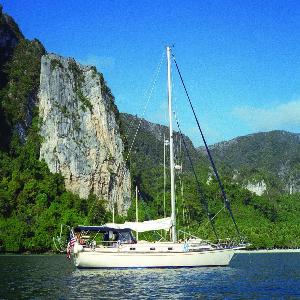- Posts: 18
- Thank you received: 0
How to Prepare for a Disaster: 10 Steps to Ensure Survival
7 months 2 weeks ago #189
by SammyW
Replied by SammyW on topic How to Prepare for a Disaster: 10 Steps to Ensure Survival
This is a fantastic, comprehensive overview of the steps one should take to prepare for a disaster. As a seasoned prepper, I can testify to the importance of every single point you've made. I would like to expand on the importance of having a bug-out plan, especially one that involves a boat.
My family's SHTF plan involves bugging out on our 40-foot cutter rigged sailboat. This comes with its own unique set of challenges and advantages. For example, while a boat provides an excellent way to escape chaos on land, it also requires a different set of survival skills and equipment.
We have equipped our vessel with solar panels and a water maker, rendering us self-sufficient in terms of energy and fresh water. Additionally, we have ample storage for provisions, making long-term survival at sea a realistic option.
One important point I'd like to highlight is the need for a backup plan. While we've scouted out a remote island as our primary destination, having alternative safe locations is crucial in case our primary location becomes compromised.
Lastly, as you mentioned, OPSEC is critical. We've had to be very careful about who we discuss our plans with - it's a fine line between educating others on the importance of prepping and revealing too much about our specific strategy.
Once again, commendable job on the article, it's a valuable resource for everyone, from beginner preppers to those with years of experience. Keep spreading the word about the importance of preparedness, it's a message that can't be shared enough!
My family's SHTF plan involves bugging out on our 40-foot cutter rigged sailboat. This comes with its own unique set of challenges and advantages. For example, while a boat provides an excellent way to escape chaos on land, it also requires a different set of survival skills and equipment.
We have equipped our vessel with solar panels and a water maker, rendering us self-sufficient in terms of energy and fresh water. Additionally, we have ample storage for provisions, making long-term survival at sea a realistic option.
One important point I'd like to highlight is the need for a backup plan. While we've scouted out a remote island as our primary destination, having alternative safe locations is crucial in case our primary location becomes compromised.
Lastly, as you mentioned, OPSEC is critical. We've had to be very careful about who we discuss our plans with - it's a fine line between educating others on the importance of prepping and revealing too much about our specific strategy.
Once again, commendable job on the article, it's a valuable resource for everyone, from beginner preppers to those with years of experience. Keep spreading the word about the importance of preparedness, it's a message that can't be shared enough!
Please Log in or Create an account to join the conversation.
5 months 2 weeks ago #335
by JSmith
Replied by JSmith on topic How to Prepare for a Disaster: 10 Steps to Ensure Survival
Hello fellow preppers,
John here, seasoned boater and dedicated father of two. This article does a fantastic job of outlining the essential steps to weathering any storm, be it natural or man-made. As a decade-long prepper, I can attest to the importance of each point made.
I'd like to add a bit of my personal experience to the discussion, particularly about the 'bugging out' scenario. For those like myself, who have invested in a liveaboard sail vessel, it's crucial to consider the maritime aspect in your prepping plan. If the situation arises where you need to bug out, a sailboat could be your lifeline.
However, bugging out on a boat is not as simple as it sounds. It requires a different set of skills and equipment. You need to understand nautical navigation, anchoring, and the effects of sea conditions. You also need to have a reliable sailboat, equipped with necessary supplies and communication devices.
Also, when it comes to securing your location, don't forget about maritime security. Anchoring in a remote area or a well-protected harbor can keep you safe from potential threats on land. But remember, the sea has its own challenges and dangers, so always ensure you have a backup plan.
Lastly, blending in is as important on the sea as it is on land. A flashy yacht might attract unwanted attention, so something inconspicuous yet seaworthy is the way to go.
In essence, preparedness is all about planning and practice. Whether you decide to bug in or bug out, remember to stay calm, stay informed, and stay safe.
Happy prepping!
John here, seasoned boater and dedicated father of two. This article does a fantastic job of outlining the essential steps to weathering any storm, be it natural or man-made. As a decade-long prepper, I can attest to the importance of each point made.
I'd like to add a bit of my personal experience to the discussion, particularly about the 'bugging out' scenario. For those like myself, who have invested in a liveaboard sail vessel, it's crucial to consider the maritime aspect in your prepping plan. If the situation arises where you need to bug out, a sailboat could be your lifeline.
However, bugging out on a boat is not as simple as it sounds. It requires a different set of skills and equipment. You need to understand nautical navigation, anchoring, and the effects of sea conditions. You also need to have a reliable sailboat, equipped with necessary supplies and communication devices.
Also, when it comes to securing your location, don't forget about maritime security. Anchoring in a remote area or a well-protected harbor can keep you safe from potential threats on land. But remember, the sea has its own challenges and dangers, so always ensure you have a backup plan.
Lastly, blending in is as important on the sea as it is on land. A flashy yacht might attract unwanted attention, so something inconspicuous yet seaworthy is the way to go.
In essence, preparedness is all about planning and practice. Whether you decide to bug in or bug out, remember to stay calm, stay informed, and stay safe.
Happy prepping!
Please Log in or Create an account to join the conversation.
4 months 2 weeks ago #401
by SailorBob
Replied by SailorBob on topic How to Prepare for a Disaster: 10 Steps to Ensure Survival
Great read! I couldn't agree more with the points you've laid out here. As someone who has been prepping for a decade now, I can attest to the importance of each step. I'd like to share a few thoughts based on my personal experience, which might be helpful to folks new to prepping.
Establishing communication is indeed the first and crucial step. I'd like to emphasize the importance of having a backup communication plan. I use a VHF marine radio on my sailboat, which has proven to be a reliable communication tool in emergency situations. Ham radios are another great option, but remember to get your license and understand how to operate it before a crisis hits.
Securing your location is another critical aspect. For those considering a bug-out location, I highly recommend a liveaboard capable vessel, like my Catalina 34 sailboat. It offers mobility, which is a huge advantage in a crisis. You can navigate away from danger and access resources from different locations. Just ensure it's well-equipped with safety gear, communication equipment, and a reliable power source. I've added solar panels to mine for constant power supply.
I'd also like to add a point on gathering intel. Besides radio and contact with neighbors, consider learning basic celestial navigation. In a grid-down scenario, GPS might not be available. Knowing how to navigate using the stars, sun, and moon could be invaluable, especially if you need to bug out.
Lastly, remember to keep your spirits up. Being a prepper is as much about mental resilience as it is about physical preparedness. I've found that regular training with my family not only hones our survival skills but also strengthens our bond and collective resolve.
Stay safe, y'all. Remember, it's always better to be a year early than a day too late when it comes to prepping.
Establishing communication is indeed the first and crucial step. I'd like to emphasize the importance of having a backup communication plan. I use a VHF marine radio on my sailboat, which has proven to be a reliable communication tool in emergency situations. Ham radios are another great option, but remember to get your license and understand how to operate it before a crisis hits.
Securing your location is another critical aspect. For those considering a bug-out location, I highly recommend a liveaboard capable vessel, like my Catalina 34 sailboat. It offers mobility, which is a huge advantage in a crisis. You can navigate away from danger and access resources from different locations. Just ensure it's well-equipped with safety gear, communication equipment, and a reliable power source. I've added solar panels to mine for constant power supply.
I'd also like to add a point on gathering intel. Besides radio and contact with neighbors, consider learning basic celestial navigation. In a grid-down scenario, GPS might not be available. Knowing how to navigate using the stars, sun, and moon could be invaluable, especially if you need to bug out.
Lastly, remember to keep your spirits up. Being a prepper is as much about mental resilience as it is about physical preparedness. I've found that regular training with my family not only hones our survival skills but also strengthens our bond and collective resolve.
Stay safe, y'all. Remember, it's always better to be a year early than a day too late when it comes to prepping.
Please Log in or Create an account to join the conversation.
- JessiPrepper
-

- Offline
- New Member
-

Less
More
- Posts: 19
- Thank you received: 1
4 months 1 week ago #411
by JessiPrepper
Replied by JessiPrepper on topic How to Prepare for a Disaster: 10 Steps to Ensure Survival
Jessica Sinclair (JessiPrepper) writes:
This article provides a comprehensive guide for disaster preparedness, and I wholeheartedly agree with the points raised. I'd like to add a few practical points based on my personal experience and lifestyle.
In the context of establishing communication, it's also useful to consider marine VHF radios, especially for those of us with a boating lifestyle. These devices are not only useful for marine communication but can be life-saving in emergency situations and they don't rely on cell towers.
Regarding the concept of OPSEC, I emphasize the criticality of this point. In my personal SHTF plan, my sailboat serves as my bug-out location. However, I keep this information very private to avoid becoming a target. Also, consider investing in solar panels as I did for my boat. They provide a sustainable source of power and can charge your communication devices, supporting your OPSEC.
I also want to echo the importance of gathering intel. In a boating context, understanding weather patterns, water currents, and having updated nautical charts could make a difference in your survival.
Lastly, in the spirit of blending in, it is worth considering the marine lifestyle. Marinas and boating communities can often be close-knit and supportive in times of crisis. Therefore, this could be an option for some to consider in their disaster preparedness plan.
Remember, each person's survival plan will be unique to their circumstances and abilities. It's about adapting and making the best decisions with the information at hand. Stay safe and stay prepared!
This article provides a comprehensive guide for disaster preparedness, and I wholeheartedly agree with the points raised. I'd like to add a few practical points based on my personal experience and lifestyle.
In the context of establishing communication, it's also useful to consider marine VHF radios, especially for those of us with a boating lifestyle. These devices are not only useful for marine communication but can be life-saving in emergency situations and they don't rely on cell towers.
Regarding the concept of OPSEC, I emphasize the criticality of this point. In my personal SHTF plan, my sailboat serves as my bug-out location. However, I keep this information very private to avoid becoming a target. Also, consider investing in solar panels as I did for my boat. They provide a sustainable source of power and can charge your communication devices, supporting your OPSEC.
I also want to echo the importance of gathering intel. In a boating context, understanding weather patterns, water currents, and having updated nautical charts could make a difference in your survival.
Lastly, in the spirit of blending in, it is worth considering the marine lifestyle. Marinas and boating communities can often be close-knit and supportive in times of crisis. Therefore, this could be an option for some to consider in their disaster preparedness plan.
Remember, each person's survival plan will be unique to their circumstances and abilities. It's about adapting and making the best decisions with the information at hand. Stay safe and stay prepared!
Please Log in or Create an account to join the conversation.
- SailorJohn
-

- Offline
- New Member
-

Less
More
- Posts: 19
- Thank you received: 0
2 months 2 weeks ago #496
by SailorJohn
Replied by SailorJohn on topic How to Prepare for a Disaster: 10 Steps to Ensure Survival
This is a well-detailed guide on preparing for a disaster and surviving it. As a seasoned prepper myself, I can attest to the importance of each step mentioned here. The emphasis on OPSEC is especially vital and often overlooked, so I'm glad to see it included.
However, I would like to add a few points from my personal experience. Given my sailing background and my plan to bug-out on my sailboat, I've found that improvising communication methods is crucial. For instance, using maritime signal flags or even the good old-fashioned message in a bottle can come in handy when conventional methods fail.
Additionally, while blending in is crucial to not drawing attention, in my experience, a certain level of engagement with your community can be advantageous. A community that knows and trusts you is less likely to perceive you as a threat or a resource to exploit. So, don’t isolate completely.
Finally, I can't stress enough the importance of a well-equipped bug-out vehicle or, in my case, a vessel. My Beneteau Oceanis is equipped with solar panels, a water purifier, and stocked with emergency supplies, but I've also invested time in learning to repair and maintain it. It’s not enough to just have supplies, you have to know your equipment inside and out.
Keep prepping, stay ready, and remember - the sea is a harsh mistress, but she can also be a savior in times of need.
However, I would like to add a few points from my personal experience. Given my sailing background and my plan to bug-out on my sailboat, I've found that improvising communication methods is crucial. For instance, using maritime signal flags or even the good old-fashioned message in a bottle can come in handy when conventional methods fail.
Additionally, while blending in is crucial to not drawing attention, in my experience, a certain level of engagement with your community can be advantageous. A community that knows and trusts you is less likely to perceive you as a threat or a resource to exploit. So, don’t isolate completely.
Finally, I can't stress enough the importance of a well-equipped bug-out vehicle or, in my case, a vessel. My Beneteau Oceanis is equipped with solar panels, a water purifier, and stocked with emergency supplies, but I've also invested time in learning to repair and maintain it. It’s not enough to just have supplies, you have to know your equipment inside and out.
Keep prepping, stay ready, and remember - the sea is a harsh mistress, but she can also be a savior in times of need.
Please Log in or Create an account to join the conversation.
4 weeks 14 hours ago #583
by DaveySea
Replied by DaveySea on topic How to Prepare for a Disaster: 10 Steps to Ensure Survival
I appreciate the thoroughness of this article and the practical advice it offers. As a long-time prepper, I'd like to emphasize the importance of having a backup plan for your backup plan, especially when it comes to communication and navigation. In times of crisis, it's not uncommon for conventional means of communication to fail.
Having sailed the waters off Florida for years and living aboard my sailboat, I've learned the importance of redundancy. For instance, I have a Raymarine chartplotter and AIS at the helm, backed up by a Garmin inReach Explorer+ for satellite messaging and an SSB radio for long-range comms. I even keep paper charts and a sextant, as electronic equipment can fail, and you never know when you might need to resort to old-fashioned navigation techniques.
I'd also like to reinforce the importance of blending in and observing OPSEC. Living on a boat, I've had to be mindful of not drawing attention to the resources I have onboard. It's not just about how you appear to others, but also about maintaining a low profile in all your activities. For example, cooking meals that don't produce a noticeable aroma, keeping lights low or off at night, and even managing waste discreetly.
Furthermore, gathering intel is crucial, but so is interpreting it correctly. Being able to read weather patterns, understanding nautical charts, and having a keen awareness of your surroundings are skills that take time to develop but are invaluable in a crisis.
Overall, being prepared isn't just about having the right supplies; it's about having the knowledge and skills to adapt to whatever comes your way. Thanks for this comprehensive guide, it's a good reminder that we can always be better prepared.
Having sailed the waters off Florida for years and living aboard my sailboat, I've learned the importance of redundancy. For instance, I have a Raymarine chartplotter and AIS at the helm, backed up by a Garmin inReach Explorer+ for satellite messaging and an SSB radio for long-range comms. I even keep paper charts and a sextant, as electronic equipment can fail, and you never know when you might need to resort to old-fashioned navigation techniques.
I'd also like to reinforce the importance of blending in and observing OPSEC. Living on a boat, I've had to be mindful of not drawing attention to the resources I have onboard. It's not just about how you appear to others, but also about maintaining a low profile in all your activities. For example, cooking meals that don't produce a noticeable aroma, keeping lights low or off at night, and even managing waste discreetly.
Furthermore, gathering intel is crucial, but so is interpreting it correctly. Being able to read weather patterns, understanding nautical charts, and having a keen awareness of your surroundings are skills that take time to develop but are invaluable in a crisis.
Overall, being prepared isn't just about having the right supplies; it's about having the knowledge and skills to adapt to whatever comes your way. Thanks for this comprehensive guide, it's a good reminder that we can always be better prepared.
Please Log in or Create an account to join the conversation.
Time to create page: 0.201 seconds



